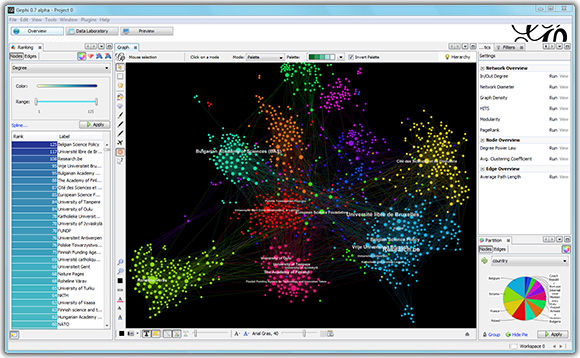by Paco Nathan
At IMVU, the Data team often works with large data sets which represent customer interactions across social graphs. This kind of data cannot be explored very well using relational databases, such as MySQL. Instead, we rely on other tools for analyzing social graphs.
One tool which we really like is called Gephi, an open source platform for visualization and analysis of graphs. Our team uses Gephi as an interactive UI for exploring relationships and patterns in graphs. We also use it for calculating social graph metrics and other statistics which help us to characterize large graphs. One favorite feature in Gephi is how readily it can be extended by writing plugins.
We’ve received much appreciated help and guidance from the Gephi developer community. Now we are glad to be able to host the first Gephi workshop about developing plugins. Bring your laptop, install the required software from sources provided, and work with mentors to learn how to write your own Gephi plugins! And get to network with other people in the Gephi developer community.
To RSVP, please click through the Meetup.com link below.
Title: Gephi Plugins Developers Workshop
Organizers: Mathieu Bastian and Paco Nathan
Date and Time: Thursday, October 6, 2011, 7:00-9:30pm
Location: IMVU, Inc.. 100 W. Evelyn Ave #110, Mountain View, CA
Cost: No cost
Food and drinks: Food, drinks, and wifi will be provided
Agenda: This is the first Gephi workshop dedicated to Gephi Plugins developers! Come and learn how to write your first Gephi plugins and ask questions.
The workshop will start with a 1-hour presentation of Gephi’s architecture and the different types of plugins that can be written with examples. Details about Gephi’s API, code examples and best practices will be presented in an interactive “live coding” way. The Gephi Toolkit will also be covered in details. The second part of the workshop will be dedicated to help individuals with their projects and answer questions. Depending on the audience’s needs we can discuss plugin design, how to code UI, databases, toolkit, data sources or any plug-in idea you have.
Gephi is modular software and can be extended with plugins. Plugins can add new features like layout, filters, metrics, data sources, etc. or modify existing features. Gephi is written in Java so anything that can be used in Java can be packaged as a Gephi plugin! Visit the Plugins Portal on the wiki and follow the tutorials.
Link to event on meetup.com: Gephi Plugins Developers Workshop
